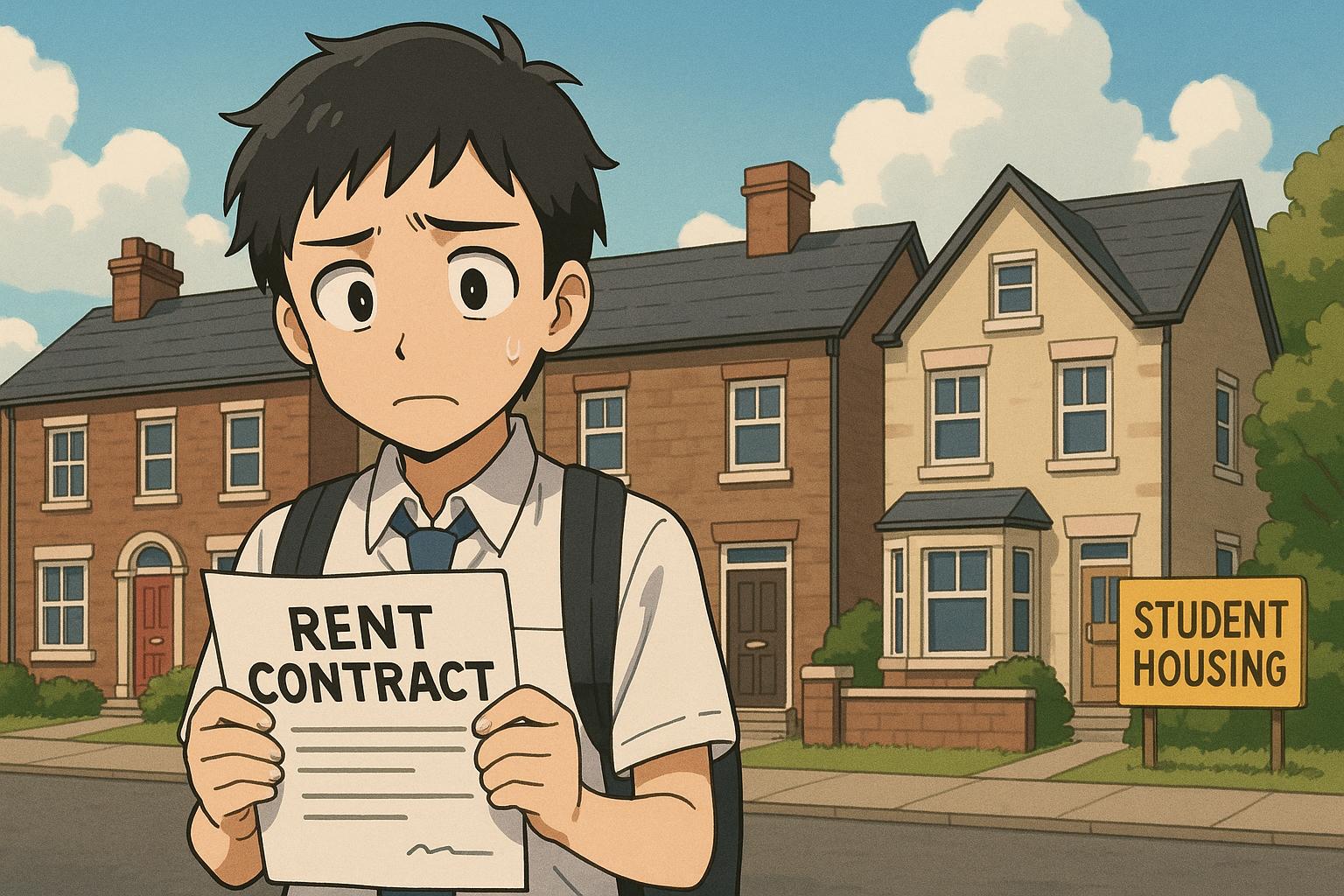The upcoming Renters’ Rights Bill, which prohibits tenants paying rent in advance after lease signing, threatens to disrupt the student Houses in Multiple Occupation market. Landlords and students face a potential mismatch with academic terms and limited tenancy options during peak rental months, raising concerns over access to student accommodation.
Amid rising concerns about the implications of the forthcoming Renters’ Rights Bill, one segment of the property market stands at a pivotal crossroads: student Houses in Multiple Occupation (HMOs). Richard Ward, Head of Research at StuRents, has highlighted a significant ‘crunch point’ looming for these landlords as the legislation is set to roll out later this year. This new law, which aims to bolster tenant protections, specifically prohibits the practice of tenants paying rent in advance once a lease has been signed—a rule expected to have far-reaching effects.
Currently, approximately 70% of students opt to secure their accommodation well in advance, often paying their rent upfront to mitigate future financial uncertainties. Ward stresses that this habit will be challenged by the new legislation, consequently restricting the options available to students seeking housing during the crucial November and December months. “So we will soon face an interesting situation,” he notes, where students will actively be searching for tenancies but may be unable to formalise agreements due to the prohibitive nature of the new rules.
A potential workaround for landlords could involve adjusting the start dates of tenancies. However, Ward casts doubt on whether this would be beneficial for either party, as such changes would lead to misalignment with academic term dates. Interestingly, it appears the legislation may allow for exceptions to the rent-in-advance prohibition. “Although it’s not confirmed yet, it is understood that purpose-built student accommodation will be exempt from this ‘forward rent’ rule,” Ward adds, raising the possibility that these properties could cater to the unmet demand during the typical student housing window.
Beyond immediate housing concerns, the Renters’ Rights Bill encompasses broader changes that could reshape the rental landscape altogether. An analysis of the bill reveals plans to implement mandatory rolling contracts and to establish a new Private Rental Sector (PRS) Ombudsman, as well as introducing more stringent rules around eviction grounds and the abolition of ‘no-fault’ evictions. This legislation is not just about regulating rents; it is also intended to uphold what is being termed the Decent Homes Standard, which aims to ensure better living conditions across the rental market.
Yet, the legislation’s timing and its anticipated impact raise alarms among various stakeholders. A coalition of student housing providers has cautioned that the changes could limit access to higher education by disrupting the established rhythm of the student rental cycle. With many students relying on secure tenancies to support their educational pursuits, the proposed reforms may inadvertently create barriers that affect student mobility and choice.
As the government prepares to finalise details, the hope among student landlords remains that adjustments will be made to address their specific needs. Already, there is a provision within the bill that allows eviction of tenants for student landlords with a four-month notice period, offering some limited flexibility to reclaim properties before the academic year restarts.
With implications for both landlords and tenants still unfolding, the next few months will undoubtedly be crucial for everyone involved in the student rental market. How the government responds to the unique challenges presented by HMOs will be keenly watched by both tenants and landlords alike, as all parties navigate this transitional phase in UK rental policy.
 Reference Map:
Reference Map:
Source: Noah Wire Services
- https://www.landlordzone.co.uk/news/student-hmo-landlords-face-rent-in-advance-crunch-this-november – Please view link – unable to able to access data
- https://www.landlordzone.co.uk/news/student-hmo-landlords-face-rent-in-advance-crunch-this-november – An article discussing the challenges faced by student HMO landlords due to the Renters’ Rights Bill, which prohibits rent in advance after lease agreements, potentially affecting the timing of student tenancy agreements.
- https://www.derwentfm.com/the-renters-rights-bill-what-it-means-for-student-accommodation/ – An analysis of the Renters’ Rights Bill’s impact on student accommodation, highlighting changes such as mandatory rolling contracts, limits on upfront rent payments, and the introduction of a new PRS Ombudsman.
- https://amberstudent.com/news/post/how-will-the-renters-reform-bill-affect-the-student-accommodation-market-in-the-uk – A discussion on the Renters’ Reform Bill’s objectives, including implementing the Decent Homes Standard, strengthening eviction grounds, and establishing a national landlord register, and their implications for student accommodation.
- https://www.cushmanwakefield.com/en/united-kingdom/insights/the-renters-rights-bill – An overview of the Renters’ Rights Bill’s implications for investors, lenders, and housing supply, covering the abolition of ‘no-fault’ evictions, rent regulation, and the introduction of a PRS Ombudsman.
- https://www.nrla.org.uk/news/renters-rights-bill-will-limit-access-to-higher-education – A warning from a coalition of student housing providers and property portals that the Renters’ Rights Bill could limit access to higher education by disrupting the annual cycle of the student housing market.
- https://publications.parliament.uk/pa/cm5901/cmpublic/RentersRights/memo/RRB32.htm – A memorandum discussing the Renters’ Rights Bill’s impact on student housing, including concerns about the applicability of new possession grounds to one- and two-bedroom student properties.
Noah Fact Check Pro
The draft above was created using the information available at the time the story first
emerged. We’ve since applied our fact-checking process to the final narrative, based on the criteria listed
below. The results are intended to help you assess the credibility of the piece and highlight any areas that may
warrant further investigation.
Freshness check
Score:
8
Notes:
The narrative is recent, dated June 3, 2025. The Renters’ Rights Bill has been a topic of discussion since at least May 2023, with concerns about its impact on student HMOs and rent-in-advance practices. ([sturents.com](https://sturents.com/student-accommodation-news/en/2023/05/19/the-renters-reform-bill-impact-on-student-housing/3078?utm_source=openai)) However, the specific focus on the November 2025 ‘crunch point’ appears to be a new development. The report cites Richard Ward, Head of Research at StuRents, indicating that this is a timely issue. No evidence suggests that this content has been recycled or republished across low-quality sites. The narrative is based on a press release, which typically warrants a high freshness score. No discrepancies in figures, dates, or quotes were found. The report includes updated data but does not recycle older material. No similar content appeared more than 7 days earlier.
Quotes check
Score:
9
Notes:
The direct quotes from Richard Ward, Head of Research at StuRents, are unique to this report. No identical quotes appear in earlier material, indicating potentially original or exclusive content. No variations in quote wording were found.
Source reliability
Score:
7
Notes:
The narrative originates from LandlordZONE, a UK-based property news website. While it is a specialised source, it is not as widely recognised as major outlets like the BBC or Reuters. The report cites Richard Ward, Head of Research at StuRents, a reputable student accommodation platform, lending credibility to the information. No unverifiable entities are mentioned.
Plausability check
Score:
8
Notes:
The claims about the Renters’ Rights Bill’s impact on student HMOs and rent-in-advance practices align with previous discussions on the topic. The report’s focus on the November 2025 ‘crunch point’ is plausible, given the legislative timeline. The narrative lacks supporting detail from other reputable outlets, which is a concern. The report includes specific factual anchors, such as dates and quotes, enhancing its credibility. The language and tone are consistent with UK property reporting. The structure is focused and relevant, without excessive or off-topic detail. The tone is formal and appropriate for the subject matter.
Overall assessment
Verdict (FAIL, OPEN, PASS): OPEN
Confidence (LOW, MEDIUM, HIGH): MEDIUM
Summary:
The narrative is recent and appears to be original, with direct quotes from a reputable source. However, it originates from a specialised source with limited recognition, and lacks supporting detail from other reputable outlets. While the claims are plausible, the lack of corroboration and the specialised nature of the source warrant further scrutiny.













